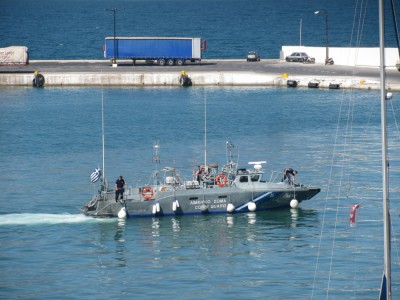In the last few days we gradually arrived in Samos and found a totally unexpected situation. The huge detention centre above Vathy is empty, all detainees have been transferred off the island, presumably to Athens, where they are either held in another detention facility or are released with the infamous White Paper.
Currently, there is an Italian Guardia Frontera ship in the harbour representing FRONTEX. The Dutch coast guard is present with a speedboat. From our observations, the latter basically go around and drink coffee at the various beaches. The Greek coast guard has two boats in Vathy, one of them is broken, though. The Italian Frontex ship leaves every night at 10 p.m. and returns in the early morning – but these days they are not very “successful”: According to what they say, they have not caught anybody during the last weeks. Inhabitants told us that still some people arrive on the island but without being caught. But compared to last year, arrivals have dropped dramatically. According to a chatty coast guard officer most refugees now choose the route via the Evros region in the north of Greece. The few people caught on the island are imprisoned in one of three police stations on the island and usually not taken to the detention centre, but sent to Athens straight.
In front of the coast guard building in Vathy, there is a small white container with three doors. A sign on the first door says “FRONTEX headquarter“ and offers a few contact numbers, a sign on the second door reads “interview room 5“. The third door does not give any hint of what might be behind it. We suppose that it leads to a “waiting room“, a small cell or an office space. To be honest, we imagined something more spectacular after all the fuss they made about the great contribution Frontex is making to the Greek coast guard, about how decisively they are intervening and about how much money they are willing to spend.
A lawyer we talked to put this into perspective. Keeping detained refugees in police cells makes access for the lawyers much more difficult, it is like the refugees are being hidden, since there is no official record who is kept where. The Frontex interview container creates another problem. It is very close to where the ships arrive in the morning, after having patrolled and potentially intercepted boats. We believe that detained refugees might be interviewed directly after arrival, and this again bypasses Greek legal safeguards. Well, admittedly, this is speculative, but we will continue to investigate. We believe it is also these little practices that are so problematic about Frontex.
In related news, the Greek government just finalised a new national action plan for the management of migration flows, and presented it to the European Commission. Due to the permanent pressure of NGOs and the European Union Greece promises to reform its whole asylum system and to implement a return policy. Screening, detention and removal are the cornerstones of the plan. Until the end of 2011 Greece intends to build at least two new detention centres for 1000 persons and „exemplary pre-return and removal centers“. Mobile screening centres shall be installed and three permanent ones in Lesvos, Evros and Rhodos. Greece asks the European Union for funding and demands the revision of the Dublin II-regulation.
There are hardly any improvements in the newly presented plan. Only vulnerable groups (unaccompanied minors, traumatised or severely sick people, victims of trafficking) are supposed to benefit from accommodation and health care (although the state prefers to have NGOs provide the service). However, the vast majority of refugees – including those returned under the Dublin II regulation – still won’t receive any support by the state and will face homelessness and other hardships. In total, this is not a new policy from which refugees and migrants can finally benefit and expect for their human rights. But, we would like to note: The Greek gov has announced so many communications of intention already, but it is clear that they are absolutely and totally out of money. We consider it unlikely that they will be able to implement this plan which sounds more sophisticated than what even the German asylum infrastructure offers.
In sum, the Greek government is paying lip service again to its critics in the EU, the national governments of the member states hold on to the Dublin regulation and the EU will give money for detention and removal.
The next days we will try to find out more about the screening container, about Frontex’s identification practices and about why arrivals have declined so dramatically.
We will keep you informed. The journey has just begun!







